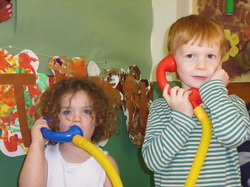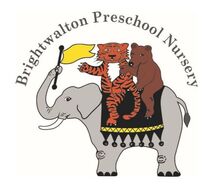
ECAT (Every Child A Talker)
During the first part of the Autumn term 2015 Brightwalton Preschool became an ECAT setting
Why was the ECAT strategy formed?
Aims of ECAT
Assessment
An ongoing assessment of each child within the setting each term and a summary of this assessment will be available for you to discuss with your child's key worker. The assessment will be split into 4 areas and notes will be made on areas/actions for development.
The 4 areas are:
1. Attention and listening
2. Understanding
3. Talking
4. Social Communication
Communication Tree
We use this communication tree to help us understand the different aspects of communication
- Every Child a Talker was a national strategy that was rolled out across England over a three year period following the Bercow Review (2008)
- It is often referred to as ECAT and is a process to identify children who may be 'at risk of delay' with speech, language and communication
- ECAT focuses on preschool children (aged 0-5 years)
- ECAT began in West Berkshire in 2010
- Sarah Wheatley Hince is the Brightwalton Preschool Nursery ECAT lead practitioner with all staff are developing skills and knowledge of process
- Meetings are held termly with other childcare providers in West Berkshire to discuss issues related to speech, language and communication
Why was the ECAT strategy formed?
- 10% of children have a long term persistent communication difficulty
- 50% of children are starting school with ‘impoverished speech, language and communication skills'
- 50-90% of children with persistent difficulties will go on to have problems with reading
- 60% of young people in young offender institutions have communication difficulties
- The Bercow review discovered that 77% of the parents who responded didn't get the information and the support required when they needed it
Aims of ECAT
- To support the identification of children 'at risk' of language communication delay and to support them as early as possible
- To improve the knowledge and skills of people working with young children
- To help parents to understand how communication develops and to provide them with the ideas to support its development
Assessment
An ongoing assessment of each child within the setting each term and a summary of this assessment will be available for you to discuss with your child's key worker. The assessment will be split into 4 areas and notes will be made on areas/actions for development.
The 4 areas are:
1. Attention and listening
2. Understanding
3. Talking
4. Social Communication
Communication Tree
We use this communication tree to help us understand the different aspects of communication
Your browser does not support viewing this document. Click here to download the document.
For more information please visit http://www.westberksecat.info/
